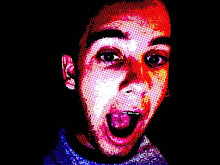
As the lights came up at the close of Ron Williams' "Happy Valley" Thursday night at the LDS film festival, I wasn't sure how I felt. I was, however, sure that I had liked the film and boy was I glad I did. Williams' documentary about the increasing substance-abuse problem in Utah Valley was undoubtedly powerful and profoundly personal. I found myself awestruck by the bravery and conviction it took for these people to come forward and tell their stories. Deeply wounded personalities told stories of broken homes and shattered lives and their honesty obviously struck a chord with the large audience assembled in the Xango Grande theatre.
The film was followed by a question and answer period, as is typical. Williams stood before the applauding crowd and gave some further insight into the film and what it meant to him. The talkback soon progressed into somewhat of a collective soap box rather than a discussion of the film's merits. This really wasn't surprising considering the nature of the film. What was surprising, though, was the manner in which Williams spoke about the project. It soon became evident that this was more than a film: it was a mission. He challenged spectators to go out and take action, to bring people to see the movie, to share the stories we had seen, to fight the problems about which we had learned so vividly. The conversation was peppered with applause and a general positive consensus in the room.
I couldn't figure out why I was bothered at first, but as I look back on the experience I see somewhat of a manipulative undercurrent that continued from Williams' film to his behavior at the talkback session. Like I said, I was glad I appreciated the film because it was made to be something more than that. But the film itself presented interesting problems that I'm still considering.
From start to finish, "Happy Valley" knows it's a film. In a certain respect it is a documentation of the process of making a documentary film and on a deeper level comments on the power the process of filmmaking can have on those involved. Williams himself, along with those whose lives he documents, makes an emotional journey throughout the narrative. This added layer both enhanced and complicated the overall effect of the film. As the film was reaching a close Williams' voice was heard in an interview telling a woman how powerful it would be for the film if she could reach out and forgive the girl responsible for her daughter's death. Later the scene took place, a powerful and heart-wrenching interaction that was then commented on again by Williams, who suggested that the two women embrace. On the one hand, I appreciate William's openness in refusing to mask his hand in the filmmaking process. He could easily have influenced the editing to make such moments seem spontaneous and perhaps more emotionally affecting. Williams, though, acknowledged in his narrative his own efforts to reach and touch an audience. On the other hand, this convention calls into question Williams' tactics in general and whether what he is doing is responsible. Obviously he is firmly committed to his cause and works tirelessly to ensure that progress is made and one cannot help but admire his own honesty and willingness to expose his methods along with his ideas, and show how the medium in which he chose to work truly has the ability to enhance lives.
Yes, the film had its manipulative moments. Yes, I found it ironic that a piece that intended to call into question Utah Valley's tendency to "guilt trip" people fell into the very same trap itself at times. Yes, I wish the honest and profoundly moving stories had been allowed to stand on their own rather than quite obviously serving as tools, the means to an end. However, I left that theatre with tremendous respect and admiration for what I had just seen. Everyone involved in this project had done something incredible and that deserves to be applauded. I continue to think that my own opinion of the documentary as a film is inconsequential and pales in comparison to the significant work being done. Here is a man using an artistic medium to uplift, inspire, and call to action a sleeping people. I admittedly am not comfortable with all of his methods but cannot say enough about how exciting something like this is. This is art doing what it is capable of doing. Sure, we may not get things completely right every time. But "Happy Valley" is a bold, unapologetic, and decided step in the right direction and needs to be seen. It is a pretty good film made by great people with a magnificent cause. And what could be better?

No comments:
Post a Comment